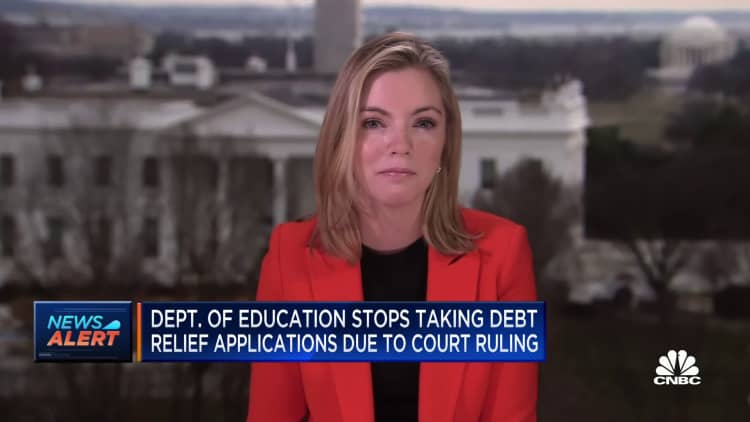Douglas Rissing | Istock | Getty Images
Plan ‘vastly exceeds’ Heroes Act authority
The six states — Nebraska, Missouri, Arkansas, Iowa, Kansas and South Carolina — argue in their brief that the Biden administration has overstepped its authority by moving to cancel up to $20,000 in student debt for tens of millions of Americans without Congress’ authorization.
The Biden administration insists that it’s acting within the law, pointing out that the Heroes Act of 2003 grants the U.S. secretary of Education the authority to make changes to the federal student loan system during national emergencies (the U.S. has been operating under an emergency declaration since March 2020 because of the Covid pandemic). The law is a product of the 9/11 terrorist attacks, and an earlier version of it provided relief to federal student loan borrowers impacted by the attacks.
However, the states counter that the Heroes Act allows the Education secretary only to modify the federal student loan system to keep certain borrowers from being in a worse-off position with their loans because of a national emergency.

They go on to say, in their brief, that the president’s plan “places an estimated 43 million Americans in a better position by eliminating all loan balances for 20 million and erasing up to $20,000 for over 20 million more. This vastly exceeds the Secretary’s authority under the Act.”
In other words, higher education expert Mark Kantrowitz said, the states are asserting that Biden is using Covid as an excuse to pass his plan.
“For example, if it was an emergency, why wait three years to provide the forgiveness?” he said. “Why present it in a political framework, as fulfilling a campaign promise?”
The states also argue that Biden’s plan would cause financial harm to their states, including a loss of profits for the companies that service federal student loans.
Borrowers deprived of ‘procedural rights’
Boonchai Wedmakawand | Moment | Getty Images
The second legal challenge the Supreme Court will consider was backed by the Job Creators Network Foundation, a conservative advocacy organization.
In its brief, the lawyers argue that two plaintiffs, Myra Brown and Alexander Taylor, were deprived of their “procedural rights” by the Biden administration because it didn’t allow the public to formally weigh in on the shape of its student loan forgiveness plan before it rolled it out. As a result, the lawyers argue, Brown and Taylor are either partially or fully excluded from the relief.
The Heroes Act exempts the need for a notice-and-comment period during national emergencies, but, like the states, the plaintiffs in this challenge also argue that that law doesn’t authorize the president’s sweeping plan.
How White House defends loan forgiveness
The attorneys also denied the claim that the Biden administration was overstepping its authority, laying out the White House’s argument that it is acting within the law under the Heroes Act of 2003.
“We remain confident in our legal authority to adopt this program that will ensure the financial harms caused by the pandemic don’t drive borrowers into delinquency and default,” U.S. Secretary of Education Miguel Cardona said in a statement.
The Supreme Court will begin to hear the cases on Feb. 28.
 EU News Digest Latest News & Updates
EU News Digest Latest News & Updates



